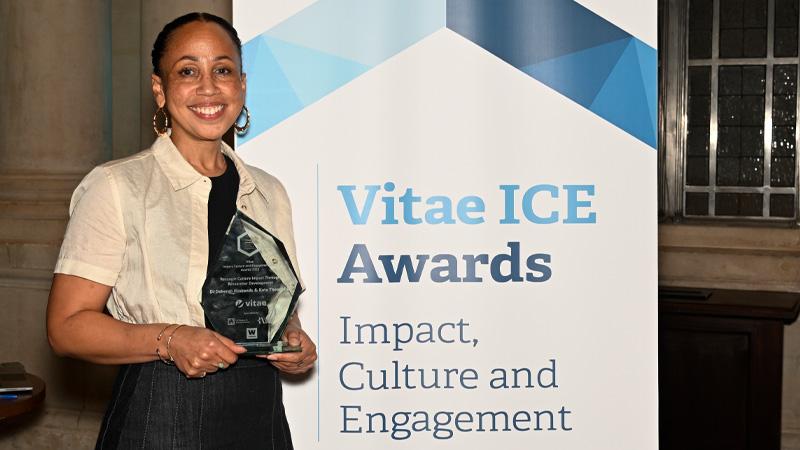Westminster colleagues Dr Deborah Husbands and Kate Theophilus have won the Research Culture Impact through Researcher Development Award at the annual Vitae Impact, Culture and Engagement (ICE) Awards. The prize was given for their work on the University’s Black History Year (BHY) Researchers Network and highlighted it’s significant contribution towards helping Black researchers reach their full potential.

The Vitae ICE Awards celebrate impactful and innovative work carried out by the researcher development community, with the Research Culture Impact through Research Development Award specifically recognising outstanding practice that demonstrates how researcher development can act as a catalyst for change in research culture.
The initiative is led by Dr Deborah Husbands, Reader in Psychology and Co-Chair of the University's Black and Minority Ethnic (BME) Colleague Network, and Kate Theophilus, Research Development Manager at the University of Westminster. The Network was set up to support Black researchers at Westminster and tackle the systemic barriers to career progression that Black academics face.
The 2021 Research Excellence Framework (REF) report revealed that Black colleagues are significantly less likely than their white counterparts to submit their research to the REF. They are also less likely to become principal investigators or co-investigators, publish research in high-quality journals or obtain grants, all of which are important for academic career development. The BHY Researchers Network addresses this gap and helps Black academics to reach their full potential through dedicated training sessions and writing retreats.
Theophilus accepted the award at a ceremony in Bristol on 22 September accompanied by Academic Engagement Librarian at Westminster Ka-Ming Pang, who nominated the team for the award.
About the award Theophilus said: “Researchers do what they do because they are passionate about their work, but we all know academia is tough at the best of times, and to be Black in research is to carry additional layers of challenge. The impact we've made with the Network is only possible because of time and energy behind the scenes from a number of brilliant colleagues, and because the support we have runs all the way from our Vice-Chancellor and Deputy Vice-Chancellors to student helpers. I'm proud to be recognised by Vitae for the work we're doing and I really do feel it speaks to the culture we already have at Westminster, as well as the one we're trying to create.”
Dr Husbands added: "This award is the product of a dream that started over five years ago, where we knew that Black histories and achievements deserved more than one month of recognition. Our plans materialised, with the support of senior leaders, into an annual year-long programme that sparked three initiatives, of which the Black History Year Researchers Network is one. Along with Kate Theophilus, support from our amazing Programme Manager Paula Cadenhead and a team that has facilitated the growth and visibility of Black researchers at the University of Westminster, it is an honour to be recognised as sector-leading by Vitae. This is more than an award. This is a statement of empowerment for those holding intersections that may have worked against them in higher education. This award says: 'We see you'."
Pang commented: “When I first read the information about Vitae's ICE Awards, I immediately thought of the BHY Researcher's Network. In my interim role as Researcher Development Manager, I was able to learn more about the sessions and events the team have put on for the network over the years, and having attended events such as the Holding the Space Conference, I can attest to the joy, passion and strength of the community they have built up and supported. The Vitae's ICE Award was the perfect opportunity to give the people behind the BHY's Researchers Network the recognition that they deserved, and I'm happy that I was able to cap off my secondment by being able to help shine a light on the great work being done by my colleagues at Westminster. Congratulations again!”
The work of the BHY Researchers Network directly contributes to the United Nations Sustainable Development Goals (SDGs) 4: Quality Education, 10: Reduced Inequalities and 16: Peace, Justice and Strong Institutions. Since 2019, the University of Westminster has used the SDGs holistically to frame strategic decisions to help students and colleagues fulfil their potential and contribute to a more sustainable, equitable and healthier society.
Learn more about Black History Year at the University of Westminster.


